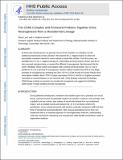The CDK8 Complex and Proneural Proteins Together Drive Neurogenesis from a Mesodermal Lineage
Author(s)
Luo, Shuo; Horvitz, Howard Robert
Downloadnihms848594.pdf (1.035Mb)
PUBLISHER_CC
Publisher with Creative Commons License
Creative Commons Attribution
Terms of use
Metadata
Show full item recordAbstract
© 2017 Elsevier Ltd At least some animal species can generate neurons from mesoderm or endoderm, but the underlying mechanisms remain unknown. We screened for C. elegans mutants in which the presumptive mesoderm-derived I4 neuron adopts a muscle-like cell fate. From this screen, we identified HLH-3, the C. elegans homolog of a mammalian proneural protein (Ascl1) used for in vitro neuronal reprogramming, as required for efficient I4 neurogenesis. We discovered that the CDK-8 Mediator kinase module acts together with a second proneural protein, HLH-2, and in parallel to HLH-3 to promote I4 neurogenesis. Genetic analysis revealed that CDK-8 most likely promotes I4 neurogenesis by inhibiting the CDK-7/CYH-1 (CDK7/cyclin H) kinase module of the transcription initiation factor TFIIH. Ectopic expression of HLH-2 and HLH-3 together promoted expression of neuronal features in non-neuronal cells. These findings reveal that the Mediator CDK8 kinase module can promote non-ectodermal neurogenesis and suggest that inhibiting CDK7/cyclin H might similarly promote neurogenesis.
Date issued
2017-02Department
Massachusetts Institute of Technology. Department of Biology; Massachusetts Institute of Technology. Department of Brain and Cognitive Sciences; McGovern Institute for Brain Research at MITJournal
Current Biology
Publisher
Elsevier BV
Citation
Luo, Shuo, and H. Robert Horvitz. “The CDK8 Complex and Proneural Proteins Together Drive Neurogenesis from a Mesodermal Lineage.” Current Biology 27, no. 5 (March 2017): 661–672.
Version: Author's final manuscript
ISSN
09609822